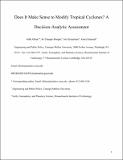| dc.contributor.author | Klima, Kelly | |
| dc.contributor.author | Morgan, M. Granger | |
| dc.contributor.author | Grossmann, Iris | |
| dc.contributor.author | Emanuel, Kerry Andrew | |
| dc.date.accessioned | 2012-12-13T21:44:07Z | |
| dc.date.available | 2012-12-13T21:44:07Z | |
| dc.date.issued | 2011-04 | |
| dc.identifier.issn | 0013-936X | |
| dc.identifier.issn | 1520-5851 | |
| dc.identifier.uri | http://hdl.handle.net/1721.1/75729 | |
| dc.description.abstract | Recent dramatic increases in damages caused by tropical cyclones (TCs) and improved understanding of TC physics have led DHS to fund research on intentional hurricane modification. We present a decision analytic assessment of whether it is potentially cost-effective to attempt to lower the wind speed of TCs approaching South Florida by reducing sea surface temperatures with wind-wave pumps. Using historical data on hurricanes approaching South Florida, we develop prior probabilities of how storms might evolve. The effects of modification are estimated using a modern TC model. The FEMA HAZUS-MH MR3 damage model and census data on the value of property at risk are used to estimate expected economic losses. We compare wind damages after storm modification with damages after implementing hardening strategies protecting buildings. We find that if it were feasible and properly implemented, modification could reduce net losses from an intense storm more than hardening structures. However, hardening provides “fail safe” protection for average storms that might not be achieved if the only option were modification. The effect of natural variability is larger than that of either strategy. Damage from storm surge is modest in the scenario studied but might be abated by modification. | en_US |
| dc.description.sponsorship | Center for Climate and Energy Decision Making (SES-0345798) | en_US |
| dc.description.sponsorship | Center for Climate and Energy Decision Making (SES-0949710) | en_US |
| dc.description.sponsorship | Carnegie Mellon University | en_US |
| dc.description.sponsorship | National Science Foundation (U.S.) | en_US |
| dc.language.iso | en_US | |
| dc.publisher | American Chemical Society | en_US |
| dc.relation.isversionof | http://dx.doi.org/10.1021/es104336u | en_US |
| dc.rights | Article is made available in accordance with the publisher's policy and may be subject to US copyright law. Please refer to the publisher's site for terms of use. | en_US |
| dc.source | Prof. Emanuel via Chris Sherratt | en_US |
| dc.title | Does It Make Sense To Modify Tropical Cyclones? A Decision-Analytic Assessment | en_US |
| dc.type | Article | en_US |
| dc.identifier.citation | Klima, Kelly et al. “Does It Make Sense To Modify Tropical Cyclones? A Decision-Analytic Assessment.” Environmental Science & Technology 45.10 (2011): 4242–4248. Web. | en_US |
| dc.contributor.department | Massachusetts Institute of Technology. Department of Earth, Atmospheric, and Planetary Sciences | en_US |
| dc.contributor.approver | Emanuel, Kerry | |
| dc.contributor.mitauthor | Emanuel, Kerry Andrew | |
| dc.relation.journal | Environmental Science and Technology | en_US |
| dc.eprint.version | Author's final manuscript | en_US |
| dc.type.uri | http://purl.org/eprint/type/JournalArticle | en_US |
| eprint.status | http://purl.org/eprint/status/PeerReviewed | en_US |
| dspace.orderedauthors | Klima, Kelly; Morgan, M. Granger; Grossmann, Iris; Emanuel, Kerry | en |
| dc.identifier.orcid | https://orcid.org/0000-0002-2066-2082 | |
| mit.license | PUBLISHER_POLICY | en_US |
| mit.metadata.status | Complete | |
